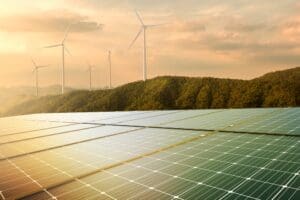The recent International Energy Agency’s finding that clean energy investment in 2024 would be twice that of hydrocarbon projects has come with good and bad news.
The good news is that clean energy investment is set to exceed US$2 trillion for the first time ever, but unfortunately, most of that investment is taking place in the Global North. Only 15% of that record investment is thought to be going to the Global South, which includes developing nations in Africa, Latin America, South Asia, and Southeast Asia. This is significantly less than what these nations need to meet their energy needs and transition to clean energy affordably.
With the Global South accounting for 56% of the world’s population but only 18% of its power generation capacity, the question remains: How can emerging and developing economies secure the clean energy finance needed not only to keep pace with the global energy transition but also safeguard their energy security? Achieving this balance is critical for ensuring the economic resilience of these nations and for building a more equitable global energy landscape.
It is a question those in the energy sector are well acquainted with, as it has been a major focus of ongoing discussions between the energy industry, governments, intergovernmental organisations, and policymakers. As CEO of a global coalition dedicated to collaboration, I believe there are key actions that can drive more equitable and affordable access to clean energy worldwide, even though the specific solutions may vary by country. These broad measures are not only necessary but essential to achieving meaningful progress on a global scale.
Firstly, we must connect those involved in clean energy security in the Global North and South. Knowledge sharing and collaboration across geographies, sectors, and specialisations, can have a multiplier effect and transformational impact on clean energy finance efforts. Public-Private Partnerships (PPP) in particular can pool resources, share expertise, and drive sustainable energy projects, while expert-level knowledge sharing can improve outputs by avoiding pitfalls and identifying easy wins.
Through knowledge-sharing, those working to enhance clean energy finance in the Global South can learn about the best technologies and systems to achieve the required goals. At the same time, those working on the ground in the Global South have invaluable expertise that they can share with the technology developers and solution providers to identify challenges and highlight specific local needs, which can lead to the development and identification of locally relevant solutions. Many countries in the Global South have unique infrastructure challenges, climates, landscapes, and resource availability, which need to be factored in the planning and financing of any clean energy to ensure maximum viability.
Within the technology domain, some emerging technologies are expected to have an outsize impact on clean energy security, like artificial intelligence (AI) and digitalisation. AI can help with the load forecasting and balancing of multi-energy microgrids that can include various sources of clean and conventional forms of energy. According to the Argonne National Laboratory, integrating AI into clean energy project design can potentially reduce project schedule timelines by 20%, which can translate into massive savings. AI can also enable grid optimisation is efficient and avoids waste, as well as dynamically manage energy storage and grid response. Digitalisation technologies like the Internet of Things (IoT) can allow utilities to manage demand during peak times, while data analytics can inform better operational decisions.
And of course, the most important aspect of Global South clean energy security is ensuring access to the appropriate clean energy finance and investment. While greater commitments to financing clean energy projects in the Global South have helped remedy the traditional investment shortfalls, particularly after COP28, challenges remain to access the capital. For instance, one of the major issues to securing finance and investment for clean energy projects in the Global South is risk perception and related inflated costs. Partnering with established clean energy companies and solution providers and leveraging technologies that can improve efficiency and reduce cost can help improve the outcomes of techno-economic feasibility assessments.
Having worked across various roles in the energy industry, I’ve witnessed firsthand how collaboration, technology, and equitable access to finance are not just beneficial but essential in driving clean energy finance on a global scale. The potential for energy-driven economic growth is immense, but it can only be unlocked through these strategic changes, like those we already see taking root at the Global Impact Coalition.
Take, for instance, SUEZ, a global leader in circular solutions for water and waste, which joined us at the Global Impact Coalition in September 2024. This move enhanced SUEZ’s ability to collaborate across the chemical and energy sectors, whilst also reinforcing the coalition’s mission to drive net-zero emissions. Backed by major players such as Mitsubishi Chemical Group, SABIC, BASF, and Covestro, the coalition has made significant strides, including developing new technologies for plastic waste processing that not only lower carbon footprints but also make the process more affordable by boosting polymer recycling efficiency. These partnerships and technological developments are not just symbolic gestures—they are the driving force behind the chemical industry’s efforts to lead the energy transition and capitalize on its potential for sustainable growth.
The lesson here is unmistakably clear: collaboration, whether through knowledge exchange, technology, or direct investment, is the linchpin of a successful energy transition. But this need for collaboration is particularly acute in the Global South, where clean energy security and investment hinges on such partnerships. Without them, the promise of a just, affordable and sustainable energy future will remain out of reach for many.
To foster such partnerships, we must support international events like ADIPEC, the world’s leading energy event currently unfolding in Abu Dhabi, where real connections are being forged, and transformative agreements are being established and expanded. With attendees from 160 countries and 2,220+ organisations, the event is fostering a collaborative environment, prioritising diversity, equity, and inclusion to ensure that voices from across the world can unite around the shared mission of delivering the future energy system.
The Global Impact Coalition takes pride in participating in industry-leading events like ADIPEC, where our ambitions for a low-carbon future are fully aligned. Our goal to cut greenhouse gas emissions entirely from the chemical industry is not just a target—it’s a necessity. To achieve this, we are leveraging both existing and future collaborations to enable a greater push towards energy technology and energy access. By doing so, we aim to ensure that the energy transition is not just about decarbonization but also about delivering energy security, affordability, and sustainability on a global scale.
By harnessing cost-saving and cost-reducing technologies, sharing knowledge and expertise, and securing mutually beneficial partnerships, the collective international community can work together to ensure the energy transition is truly affordable, equitable, and sustainable.
Read more:
How collaboration, AI, and finance can bridge the Global North-South clean energy gap
















